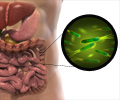High use of multipurpose household cleaning products can alter gut bacteria in babies and increase their risk of becoming overweight.
- Heavy use of household cleaning products and disinfectants may alter the gut bacterial flora of infants and young children
- Altered gut microbiota in babies and young children can increase their risk of becoming overweight with associated complications
Using disinfectants and multipurpose cleaners regularly at home can increase the risk of overweight in babies by altering their gut microbial flora, according to a recent study conducted by scientists across Canada. The findings of the study are published in CMAJ (Canadian Medical Association Journal).
Effects of Household Cleaning Products on Gut Flora and Weight of Infants
Scientists collected data from the Canadian Healthy Infant Longitudinal Development (CHILD) birth cohort about bacteria in the stools of babies. They employed the World Health Organization (WHO) growth charts to derive body mass index (BMI) scores.- The team looked at the gut microbiota of 757 babies aged 3-4 months and later, their weight at ages 1 and 3 years with regards to exposure to household cleaners and disinfectants, detergents and eco-friendly products
- Presence of altered gut bacteria in babies 3-4 months old was highest in households with heavy use of household disinfectants such as multi-surface cleaners. The stools demonstrated decreased amounts of Haemophilus and Clostridium bacteria but greater amounts of Lachnospiraceae
- An increase in Lachnospiraceae bacteria levels was noted with more frequent use of disinfectants
- Similar alterations were not observed with detergents or eco-friendly cleaners.
- Previous studies on piglets have shown similar changes in the gut microbial flora when exposed to disinfectant sprays
"We found that infants living in households with disinfectants being used at least weekly were twice as likely to have higher levels of the gut microbes Lachnospiraceae at age 3-4 months; when they were 3 years old, their body mass index was higher than children not exposed to heavy home use of disinfectants as an infant," said Anita Kozyrskyj, a University of Alberta pediatrics professor, and principal investigator on the SyMBIOTA project, an investigation into how alteration of the infant gut microbiome impacts health.
TOP INSIGHT
Using detergents or eco-friendly cleaning products is less likely to make babies and toddlers overweight.
- Babies from homes that used detergents and eco-friendly cleaners had a different set of gut bacteria and carried a lower risk of becoming overweight as toddlers
Thus, the findings of the study seem to suggest that multipurpose disinfectants and household cleaners may alter gut bacteria, particularly the Lachnospiraceae family in babies and increase their risk of overweight.
"Antibacterial cleaning products have the capacity to change the environmental microbiome and alter risk for child overweight," write the authors. "Our study provides novel information regarding the impact of these products on infant gut microbial composition and outcomes of overweight in the same population."
Kozyrskyj adds that using eco-friendly products could be associated with an overall healthier lifestyle and dietary habits in the mother, contributing in turn to the healthier gut bacteria and an ideal weight of their infants.
Possible Study Limitations
Dr. Kozyrskyj agrees that further studies are needed to classify cleaning products by their actual composition, which was not done in the current study.In conclusion, epidemiologists Dr. Noel Mueller and Moira Differding, Johns Hopkins Bloomberg School of Public Health write in a related commentary that the current study can pave the way for future studies on the use of household disinfectants as one of the risk factors of childhood obesity through alterations in gut microbial flora.
Reference:
- Mon H. Tun, Hein M. Tun, Justin J. Mahoney, Theodore B. Konya, David S. Guttman, Allan B. Becker, Piush J. Mandhane, Stuart E. Turvey, Padmaja Subbarao, Malcolm R. Sears, Jeffrey R. Brook, Wendy Lou, Tim K. Takarao, James A. Scott and Anita L. Kozyrskyj., "Postnatal exposure to household disinfectants, infant gut microbiota and subsequent risk of overweight in children" CMAJ September 17, (2018) 190 (37) E1097-E1107; DOI: https://doi.org/10.1503/cmaj.170809
 MEDINDIA
MEDINDIA





 Email
Email








